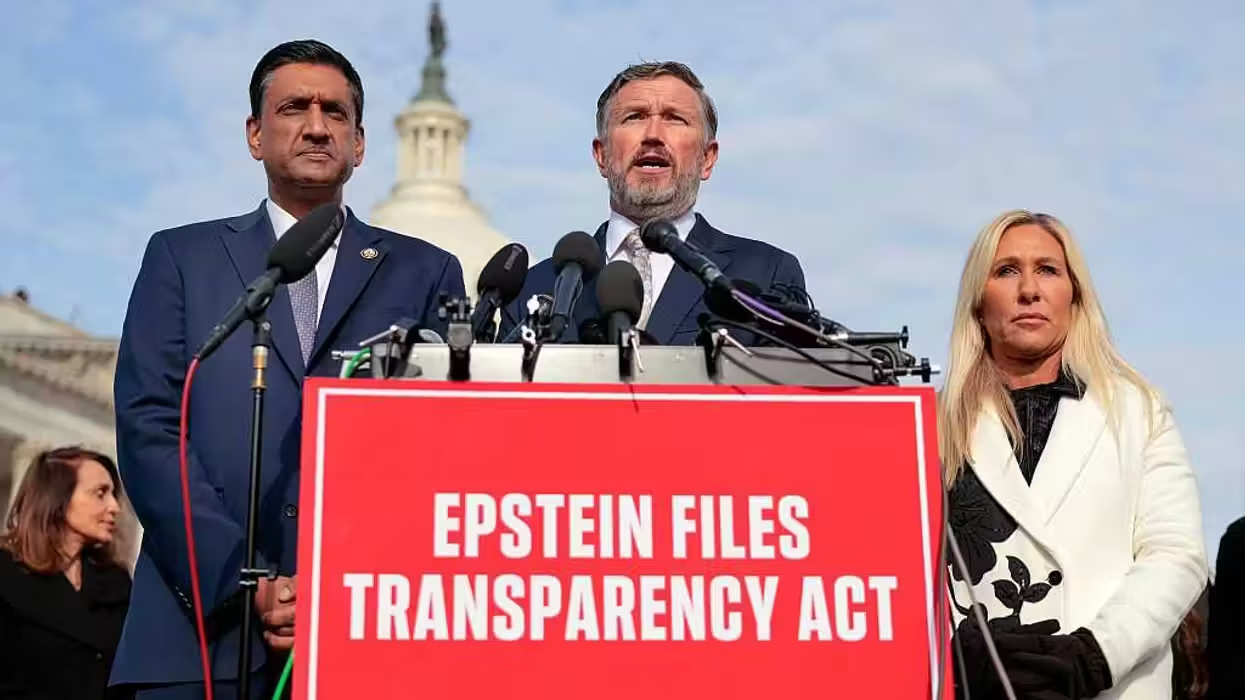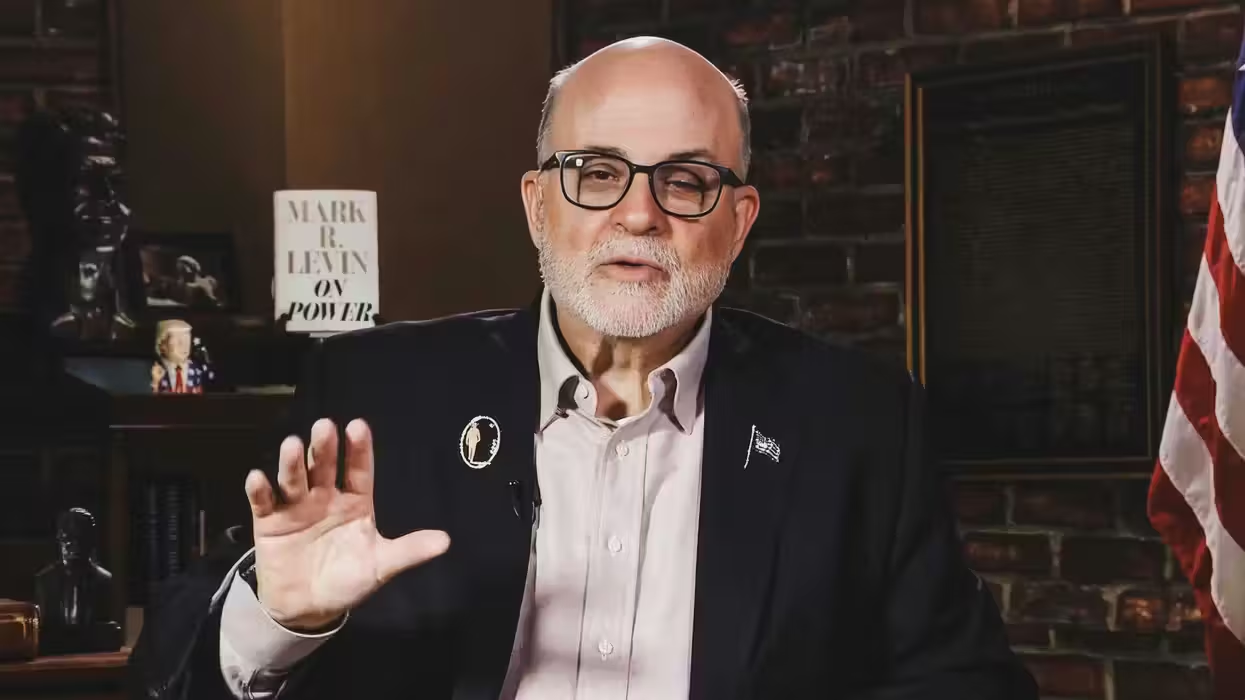
© 2025 Blaze Media LLC. All rights reserved.
Dinesh D'Souza's powerful new movie doesn't settle moral arguments about injustice and inequality in America - but it offers a powerful dissent from the growing leftist orthodoxy that is enforced on college campuses.
This weekend I saw a movie that reminds me one of President Ronald Reagan’s stirring campaign speeches.
To mark Independence Day, Dinesh D’Souza released the film version of his recent book "America: Imagine a World Without Her." It’s a powerful, controversial film which will keep your interest, provoke disputes, and bring you to tears: my eyes were welling up in the first five minutes, and I had to keep wiping them dry.
The film addresses profound moral and historical questions that will send you from the theater straight to Amazon, where you’ll want to order half a dozen books to read more about the issues. How many films accomplish that nowadays?
 Dinesh D'Souza during a radio interview. Photo Credit: www.christianitytoday.com
Dinesh D'Souza during a radio interview. Photo Credit: www.christianitytoday.com
It is a film with a definite point of view: D’Souza, an immigrant from India and unabashed American patriot, sets out to defend America’s founding principles and her historical record of living up to them. He addresses a series of radical critiques lodged by “progressive” academics and activists - and widely disseminated through textbooks like "A People’s History of the United States," which liberal professors assign to students across the U.S. by the hundreds of thousands.
D’Souza interviews radical activists, ranging from a Native American who wants to take back the land that contains Mount Rushmore and a Chicano activist who hopes that Mexico can reclaim the U.S. southwest, to Noam Chomsky and Ward Churchill - the professor who compared the victims of Sept. 11, 201 to Nazi officials who died in Allied bombings. But the film doesn’t focus on provocations or outrageous statements.
It examines with as much seriousness as a film this short can manage, the following indictments against the American regime:
- It was founded on conquest and genocide aimed at the Indians.
- It built its wealth on the backs of African slaves, and is essentially white supremacist.
- It expanded by unjustly stealing land from its neighbor Mexico.
- It is consistently imperialist and aggressive toward other countries.
- It is dominated by an unjust and exploitative capitalist system that harms the poor.
Obviously, a two-hour film cannot dispose of such charges definitively, and D’Souza doesn’t pretend that it can. What he does try to do in the film is to highlight how dominant these five facile assertions have become among younger Americans, creating a comprehensive narrative of unique American evil: a demonic mirror image of the brash American triumphalism pushed by the neo-conservatives in their days of influence.
What D’Souza does effectively is to plant essential doubts about the fairness and accuracy of each of these charges against America - and point out how Americans have been driven by the country’s own founding principles to rectify injustices in a manner that few other nations have felt the need to do. For example: Are there movements among the Turks to give back the land their ancestors stole from the Byzantines?
America is built on an idea. But it rests on much more than that - and if it didn’t, it would have collapsed long ago.
 "America" book cover.
"America" book cover.
For example, the same ideas that Americans embraced were also adopted by founders of independent countries throughout South America - where liberty did not prosper. Because our founding did not emerge from one king defeating another, or one tribe bathing its hands in its enemies’ blood and brains (a Native American practice), we are prone forever to judge ourselves against the abstract standards laid out in our Declaration of Independence. In much the same way, the concrete, historical Church compares itself constantly to the standards laid out in the Gospels. It was not for nothing that G. K. Chesterton called America “a nation with the soul of a church.”
I have written before, at the height of neo-conservative attempts to remake the world in America’s image, of the dangers involved in loving “America the Abstraction” at the expense of the concrete, historical country.
It is true that the American colonies rebelled against Great Britain by invoking abstract assertions about the rights of human beings - profound, beautiful, worthy assertions that grew out of the Christian vision of the dignity of the person.
But if we treat America’s founding assertions as an ideology, a philosophy in arms that we regard as comprehensive, perfect, and universally true, we will fall into any number of dangerous temptations.
First of all, we may look at every regime that existed before 1776 as somehow stunted and primitive, a botched attempt to achieve the perfected government that would only be attained in America. Such provincialism will alienate us from almost the entire Western heritage, and cause us to miss the many incremental steps toward liberty that took place over the centuries, or the essential role of Christian faith in discovering and fully realizing the idea of human dignity. We will give the Enlightenment credit that the churches really deserve - including ultimate credit for every truth reasserted by John Locke or Thomas Jefferson.
Even worse, we will view every other country as a failed or potential America - and every citizen in the world as an American in waiting. We will rashly intervene in other countries to promote “democracy,” and end up creating regimes that practice “one man, one vote, one time.”
[sharequote align="center"]What makes America is not that it is governed democratically, but that it guarantees our liberties.[/sharequote]
What matters about America is not that it is governed democratically, but that it guarantees our liberties. Those were what our founders cared about, and they worried among themselves whether democracy would effectively protect the rights of minorities - especially those creative minorities that tend to get rich by creating wealth - from the cruelty and intolerance of the masses.
Comparatively few cultures are really ready and willing to protect their minorities, and in such cultures a democratic government might prove even crueler than an inherited monarch would. It took the highly undemocratic step of diktats from the United States Supreme Court to overturn the massively popular segregation laws in America’s South.
We need to see the American system the way our founders did: As a fruit of Western civilization, an outgrowth of Christian Europe, a technique of preserving for our own people the maximum freedom possible without destroying the common good. We view the person, the citizen, not through the narrowed, jaundiced eye of a utopian who wishes to remake human nature, but with the same realistic awareness of human sinfulness that St. Augustine passed along to the churchgoing Christians who made up most of the signers of the Declaration of Independence.
I think that D’Souza understands all of this. That is why he has produced this powerful document defending the concrete, historical fact that is the United States of America against the angriest charges lodged by those who somehow expect that a country with hundreds of millions of people can purely and perfectly incarnate a set of abstract ideas.
But we can try, and millions of us have nobly tried for more than 200 years, and the very effort ought to inspire our love and loyalty. This film is an act of loyalty, even piety, directed towards our country and our forefathers. It’s a film that every American ought to see, then go home and argue about. There’s nothing more American than that.
John Zmirak is co-author of the upcoming "The Race to Save Our Century" (Crossroad, 2014), available for pre-order at many online and local bookstores. His columns are archived at www.badcatholics.com.
–
TheBlaze contributor channel supports an open discourse on a range of views. The opinions expressed in this channel are solely those of each individual author.
Want to leave a tip?
We answer to you. Help keep our content free of advertisers and big tech censorship by leaving a tip today.
Want to join the conversation?
Already a subscriber?
<a href="https://stream.org/author/johnzmirak/">John Zmirak</a> is a senior editor at the Stream and author or coauthor of 10 books, including <a href="https://www.amazon.com/Politically-Incorrect-Guide-Immigration-Guides/dp/1621576736">"The Politically Incorrect Guide to Immigration"</a> and <a href="https://www.amazon.com/Politically-Incorrect-Guide-Catholicism/dp/1621575861">"The Politically Incorrect Guide to Catholicism"</a>. His newest book is <a href="https://www.calamopress.com/store/no-second-amendment-no-first">"No Second Amendment, No First."</a>
John Zmirak
John Zmirak is a senior editor at the Stream and author or coauthor of 10 books, including "The Politically Incorrect Guide to Immigration" and "The Politically Incorrect Guide to Catholicism". His newest book is "No Second Amendment, No First."
more stories
Sign up for the Blaze newsletter
By signing up, you agree to our Privacy Policy and Terms of Use, and agree to receive content that may sometimes include advertisements. You may opt out at any time.
Related Content
© 2025 Blaze Media LLC. All rights reserved.
Get the stories that matter most delivered directly to your inbox.
By signing up, you agree to our Privacy Policy and Terms of Use, and agree to receive content that may sometimes include advertisements. You may opt out at any time.






